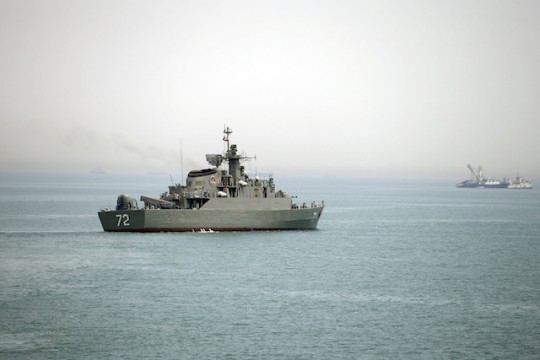Details are still coming in, but it seems clear that the Iranian Navy seized a container ship called the Maersk Tigris that was transiting the Strait of Hormuz this morning. The ship, flagged in the Marshall Islands and owned by a Danish conglomerate, was traveling on an internationally recognized shipping route when it was approached by Iranian vessels that ordered it to "proceed further" into Iranian waters. The captain refused, and the Iranian vessels fired warning shots. The captain then "complied with the Iranian demand and proceeded into Iranian waters in the vicinity of Larak Island," according to a Pentagon spokesman. The Iranians have boarded the ship.
As the news of this act of piracy started to circulate, and after some confusion about whether or not the ship was U.S. flagged (it's not), there was some discussion on social media about whether or not the United States is obligated to defend the interests of the Marshall Islands (it is) and whether or not there were any American citizens aboard (there don't appear to be). Some of this was understandable fact finding, but some of it also seemed motivated by a desire to downplay the significance of the incident, and to diminish the expectation that the United States needs to respond, even as the Navy has already ordered a destroyer to monitor the situation.
Answers to these questions are immaterial. All that matters is that Iran has seized a ship on an internationally recognized shipping route, in the precise place--the Strait of Hormuz--where the United States has long claimed to guarantee the freedom of navigation and of commerce. It is likely that this is a response to the U.S. Navy having stared down a convoy of Iranian ships that appeared to be bound for Yemen last week, which turned around rather than force a confrontation. Iran's message is clear: We are in charge in the Straits of Hormuz. Its challenge is also clear: What now, USA?
The facts that the Marshall Islands are a U.S. protectorate, that there are no Americans on board, and that Denmark is a NATO ally are relevant but secondary. The challenge to American supremacy and the liberal world order would be the same if the ship was flagged in Kenya and owned by a Brazilian company.
So what now? The Iranians are no doubt (safely!) wagering that the United States will not take military action in response. It may also (reasonably!) believe that, even beyond declining to respond militarily, the Obama administration may decline to respond in any meaningful way, in order to preserve its hope of a nuclear deal and better relations with Tehran. Of course, the administration has hoped that such a deal would facilitate the rise of an Iran that, no longer under threat from the United States, would evolve into a responsible member of the community of nations. The Iranian Navy provided a good illustration this morning of the reasonableness of such hopes.
If the Iranians do not swiftly release the ship, and the White House does nothing beyond lodge symbolic complaints, the failure to respond meaningfully will constitute more than a violation of its agreements with a protectorate and an ally. The failure will certify to the world that the United States is willing to cede control of the Strait of Hormuz to a piratical and lawless regime. Along with internationally recognized European land borders, it will be clear that the freedom of navigation in the Persian Gulf is something that the United States no longer guarantees.
Update 3:35 P.M.: This post has been updated to include details about the seizure of the Maersk Tigris that have become clear since this morning. In particular, a spokesman for the Department of Defense suggests that the ship was in Iranian waters at the time of its seizure, though on an internationally recognized shipping route through which "innocent passage" is expected to be unchallenged.
